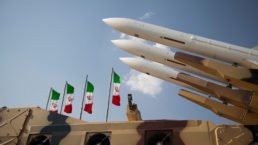Trump promises a deal by mid-June, but many obstacles remain.
By Tarique Niazi, Foreign Policy In Focus
The second round of Iran-U.S. talks on April 19 has successfully concluded in Italy. The Omani embassy in Rome hosted the talks, which went on twice as long as those held in Oman on April 12. Most importantly, Iran and the United States have agreed to a third round of discussions on April 26. Before this third round there will be a meeting of experts from both countries to discuss nuclear de-escalation, uranium enrichment, verification mechanisms, and the lifting of economic sanctions.
Oman’s Foreign Ministry said in a statement that both sides agreed to ensure that Iran is “completely free of nuclear weapons and sanctions, and maintaining its ability to develop peaceful nuclear energy.”
This second round was preceded by intense rhetoric on both sides. Iran’s supreme leader deflated the hopes of success in the talks, while President Trump’s Special Envoy Steve Witkoff asked Iran to “dismantle” a nuclear program that it considers its red line.

The talks did not, however, reach a dead end. It is common for negotiators to take maximalist positions to appease different constituencies before they even sit around the negotiating table. The first round of Iran-U.S. talks already defied gloomy predictions when it successfully took place on April 12 in Muscat, Oman. The host Sayyid Badr al Busaidi, Oman’s foreign minister, treated both Iranian and U.S. delegations at his residence to the centuries-old Arab tradition of hospitality.
Seated in separate rooms in the minister’s house, the delegates conducted four rounds of talks. As a go-between, al Busaidi delivered and redelivered communications that lasted two-and-a-half hours. In the Iran-U.S. context, the duration of communication is of special significance. Two estranged nations, talking to each other through an intermediary, would not have communicated that long had they not found common ground. Also, they agreed to communicate in writing, which allowed both sides to read, unfiltered, each other’s intents and purposes. To avert the pitfalls of mistranslation, both sides consented to converse and write in English.
At the end of the talks, the hosts were overjoyed, both delegations were all smiles, and Tehran and Washington echoed each other in describing the talks as “positive” and “constructive.” As a further indication of progress, both delegations agreed to the second round of talks. Most important of all, the Iranian delegation and its leader Abbas Araghchi, Iran’s foreign minister, broke an almost 50-year-old taboo by exchanging greetings with the U.S. delegation and its leader Steve Witkoff.
Recent Posts
New Addition to List of Nuclear Near Catastrophes
February 25, 2026
Take Action Now Debris flew for great distances — many times the distance of 270 meters to a nuclear reactor and nuclear storage facility.By David…
Gavin Newsom’s last budget belies his ‘California for All’ pledge
February 24, 2026
Take Action Now Yet, even as the state is poised to lose billions in federal funding, and millions of Californians are losing access to health care…
Israel and American Hawks are Pushing U.S. to Iran War With Catastrophic Consequences
February 23, 2026
Take Action Now At the World Health Assembly in May, member states may endorse an unprecedented strategy declaring that health is not a cost – but…
A Child’s View of the Attack on Venezuela. And a Peace Flotilla
February 23, 2026
Take Action Now Fabricio said that he and his family went out of their building and saw many people also going outside, running around, and kids…




